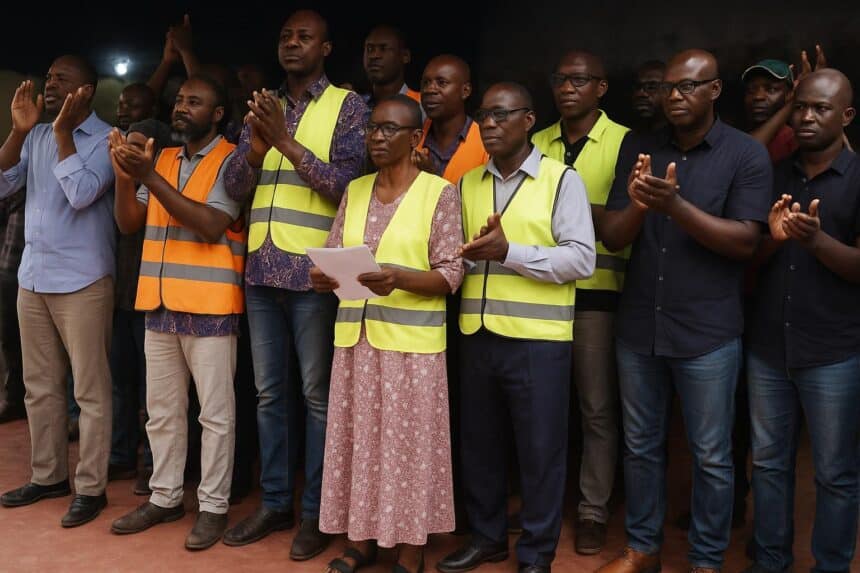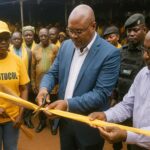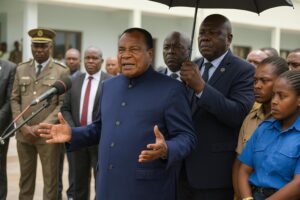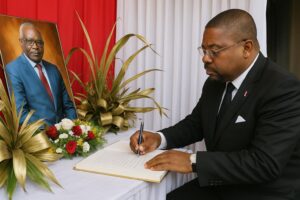Growing tension around E2C casual workforce
Dawn traffic on Avenue des Trois-Martyrs slows each time a group of blue-overall workers gathers near the headquarters of Energie électrique du Congo. The casual employees, known locally as ‘journaliers’, say their patience is thinning after months of unanswered paperwork and promises.
On 5 September in Brazzaville the National Collective of Abandoned Day Laborers publicly accused E2C of letting the conclusions of a 11 March 2025 meeting fade away. Local radio Top Congo FM and daily Les Dépêches de Brazzaville both relayed the statement during their midday news slots.
A promise made on 11 March 2025
According to the collective, management, police representatives and officials from the Ministry of Energy agreed in March to enrol every temporary worker involved in electricity distribution and sales nationwide. Fingerprint kits and forms were even installed in several districts, raising hopes of quick regularisation (Les Échos du Congo).
The commitment followed an earlier ‘setting’ session chaired on 13 February, designed to end sporadic sit-ins that had slowed meter replacement projects. ‘We were told the lists would be processed within weeks,’ recalls Joseph Mouanga, a cable splicer who has worked without contract for eight years.
Workers feel dialogue stalls
‘Since our enrolment, nothing came back, not a badge, not a call,’ the collective lamented in its statement. It labels the silence a mark of ‘irresponsibility’ while insisting that protest remains their last resort. Many journeymen survive on daily allowances of 3 000 CFA, below urban living costs.
E2C has not issued a fresh press release. A company technician, speaking anonymously because he is not authorised to comment, suggests that file verification is ‘progressing internally’ but slowed by cross-checking with provincial branches. He stresses that ‘no one inside wants confrontation; the objective is safer, reliable power’.
Authorities recall national priorities
Officially, the Ministry of Energy cites the broader agenda set by President Denis Sassou Nguesso: universal access, grid modernisation and social cohesion. ‘Any labour measure must fit the sectoral roadmap and fiscal space,’ a senior advisor notes, adding that casual workers are recognised as ‘partners in national development’.
Observers point out that the state already subsidises tariffs to protect households from global price shocks. Balancing payroll expansion with investment in new substations in Pointe-Noire and Ouesso, they say, requires meticulous budgeting that sometimes lengthens administrative processes.
Economic stakes of national electricity grid
Regularisation could bring roughly 1 200 casual workers under social security, a step welcomed by labour economists at Université Marien-Ngouabi. They estimate the formalisation could inject 300 million CFA into tax and pension funds each year while reducing clandestine connections that cost E2C valuable revenue.
Yet the grid still faces technical losses above 20 %. Outages in May forced small bakeries to buy diesel for generators at record prices. ‘We need both motivated staff and upgraded lines,’ argues energy analyst Clarisse Okemba, praising government plans to diversify with solar fields near Djiri.
Possible comeback of street protests
The collective warns that, with the deadline mentioned in their July letters now expired, members may stage sit-ins outside E2C headquarters again. In past demonstrations they waved handwritten banners and sang the national anthem, careful to avoid blocking roads or damaging installations.
‘We remain attached to peace and to the vision of the head of state,’ spokesperson Ruddy Mavoungou clarifies. ‘Our wish is a signature, not a strike.’ Civilians interviewed on the avenue support the call for fairness but hope disruptions to electricity bills can be avoided.
Voices from inside the pick-up points
In Ouenze district, clerk Jacquie Nianga sorts cash payments behind a grilled window. She says casual collectors have become familiar faces to residents. ‘They know every pole and every arrears file. Retaining that knowledge saves time.’ Her fear is that frustration could push experienced hands toward informal jobs.
Nearby, pensioner Marcel Ebina recalls the blackout of 2023. ‘If they protest, lights may cut again,’ he worries, though acknowledging their plight. Such mixed feelings illustrate how closely household comfort is tied to the fortunes of anonymous workers climbing utility poles each dawn.
What observers say could happen next
Negotiators from the Congolese Trade Union Confederation advise both sides to revive the March minutes inside a monitored timetable. Proposals include publishing weekly progress charts and adding a hotline for worker questions. Mediators believe transparency can dispel rumours and deter any escalation.
For now, Brazzaville braces, hoping that dialogue prevails over placards. Electricity, after all, powers the streetlights guiding pupils home and the screens broadcasting Red Devils football. The swift alignment of promises with paperwork would brighten evenings across the republic.
E2C insiders hint that a joint communiqué could appear before the end of October once audits conclude. Should that happen, the collective would likely suspend any march, delivering a rare win-win where workers gain stability and the company strengthens customer trust ahead of the festive consumption peak.






















